Related Research Articles

Conservative Judaism, also known as Masorti Judaism, is a Jewish religious movement that regards the authority of Jewish law and tradition as emanating primarily from the assent of the people through the generations, more than from divine revelation. It therefore views Jewish law, or Halakha, as both binding and subject to historical development. The Conservative rabbinate employs modern historical-critical research, rather than only traditional methods and sources, and lends great weight to its constituency, when determining its stance on matters of practice. The movement considers its approach as the authentic and most appropriate continuation of Halakhic discourse, maintaining both fealty to received forms and flexibility in their interpretation. It also eschews strict theological definitions, lacking a consensus in matters of faith and allowing great pluralism.
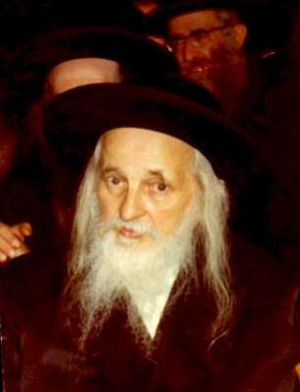
Joel Teitelbaum was the founder and first Grand Rebbe of the Satmar dynasty.

Ner Israel Rabbinical College, also known as NIRC and Ner Yisroel, is a Haredi yeshiva in Pikesville, Maryland. It was founded in 1933 by Rabbi Yaakov Yitzchok Ruderman, a disciple of Rabbi Nosson Tzvi Finkel, dean of the Slabodka yeshiva in Lithuania. Rabbi Aharon Feldman, a disciple of Rabbi Ruderman and a member of the Moetzes Gedolei HaTorah of America, became its head in 2001.

Hugo David Weisgall was an American composer and conductor, known chiefly for his opera and vocal music compositions.
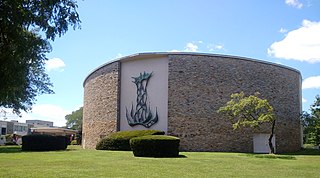
Chizuk Amuno Congregation is a Conservative Jewish congregation and synagogue, located on Stevenson Road, in Pikesville, a suburb of Baltimore, Maryland, in the United States.

Congregation Baith Israel Anshei Emes, more commonly known as the Kane Street Synagogue, is an egalitarian Conservative synagogue at 236 Kane Street in the Cobble Hill neighborhood of Brooklyn in New York City, New York, United States. It is the oldest continuously operating synagogue in Brooklyn.
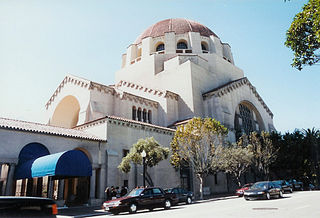
Congregation Emanu-El of San Francisco, California is one of the three oldest Jewish congregations in California, and one of the largest Jewish congregations in the United States. A member of the Union for Reform Judaism, Congregation Emanu-El is a significant gathering place for the Bay Area Jewish community.

B'nai Israel Synagogue is a Modern Orthodox synagogue located in the historic Jonestown neighborhood, near downtown and the Inner Harbor of Baltimore, Maryland, in the United States. The synagogue is one of the oldest synagogue buildings in the United States.

The Lloyd Street Synagogue is a Reform and Orthodox Jewish former synagogue located on Lloyd Street, Baltimore, Maryland, in the United States. The Greek Revival-style building is the third oldest synagogue building in the United States and was the first synagogue building erected in Maryland. The building was listed on the National Register of Historic Places in 1978 and designated as a Baltimore City Landmark in 1971.

Marc H. Tanenbaum (1925–1992) was a human rights and social justice activist and rabbi. He was known for building bridges with other faith communities to advance mutual understanding and co-operation and to eliminate entrenched stereotypes, particularly ones rooted in religious teachings.

Beth Sholom Congregation is a Conservative Jewish congregation and synagogue, located at 1011 North Market Street, in Frederick, Maryland, in the United States.

Beth Am is a Conservative Jewish congregation and synagogue, located in the Reservoir Hill community of Baltimore, Maryland, in the United States. It is one of two non-Orthodox synagogues in Baltimore's inner city. The current congregation was formed in 1974 by Dr. Louis L. Kaplan and other congregants after Chizuk Amuno put the building up for sale.

Temple Israel is a Reform Jewish congregation and synagogue located at 1376 East Massey Road, in Memphis, Tennessee, in the United States. It is the only Reform synagogue in Memphis, the oldest and largest Jewish congregation in Tennessee, and one of the largest Reform congregations in the U.S. It was founded in 1853 by mostly German Jews as Congregation B'nai Israel. Led initially by cantors, in 1858 it hired its first rabbi, Jacob Peres, and leased its first building, which it renovated and eventually purchased.
Sidney Sakols was a real estate executive, World War II veteran, composer, inventor, activist, and eccentric Baltimore native.
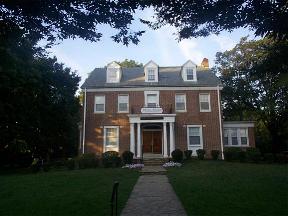
Few Jews arrived in Baltimore, Maryland, in its early years. As an immigrant port of entry and border town between North and South and as a manufacturing center in its own right, Baltimore has been well-positioned to reflect developments in American Jewish life. Yet, the Jewish community of Baltimore has maintained its own distinctive character as well.
Beth El Congregation is a Conservative Jewish congregation and synagogue, located at 8101 Park Heights Avenue, in Pikesville, an outer suburb of greater Baltimore, Maryland, in the United States. The congregation was established in 1948.

Temple B'nai Israel is a Reform Jewish congregation and synagogue located at 4901 North Pennsylvania, Oklahoma City, Oklahoma, in the United States. The congregation is the oldest active Jewish congregation in Oklahoma.
Irving Miller was an American rabbi, Jewish leader, and Zionist.
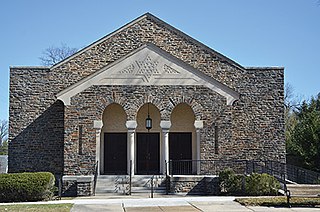
Congregation Shearith Israel is a historic Orthodox Jewish congregation and synagogue, located at 5835 Park Heights Avenue, in Park Heights, northwest Baltimore, Maryland, in the United States.
References
- 1 2 "Goldman, influential rabbi, dies." The Baltimore Sun. February 10, 1979.
- ↑ "Jewish Seminary Pre 1934".
- ↑ "Rabbi Installed at Chizuk Amuno." The Baltimore Sun. November 15, 1948.
- ↑ "Chizuk Amuno Congregation". Archived from the original on 2006-05-14. Retrieved 2006-03-01.
- ↑ "Rabbi Goldman Hails Israel, Calls On Its Foes to Repent." The Baltimore Sun. November 26, 1948.
- 1 2 "City's Racial Bans Viewed." The Baltimore Sun. June 21, 1955.
- ↑ City's Racial Bans Viewed." The Baltimore Sun. June 21, 1955.
- 1 2 "Self Survey Facts Given." The Baltimore Sun. April 26, 1955.
- ↑ "N. A. A. C. P. Warned of Anti-Semites." The Baltimore Sun. February 12, 1968.
- ↑ "N. A. A. C. P. Warned of Anti-Semites." The Baltimore Sun. February 12, 1968.
- ↑ "Rabbi Goldman retires, sees gains, losses." The Baltimore Sun. June 10, 1976.
- 1 2 "Goldman, influential rabbi, dies." The Baltimore Sun. February 10, 1979.